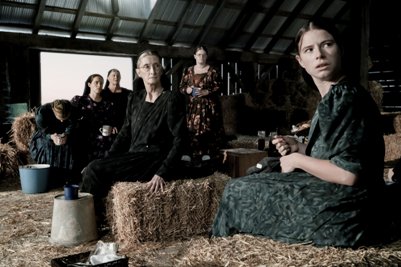 A mass incident of abuse by men in a religious community causes the women in that community to gather and talk, so they can decide what to do about it.
A mass incident of abuse by men in a religious community causes the women in that community to gather and talk, so they can decide what to do about it.
Sarah Polley is a Canadian filmmaker, an actress who eventually moved behind the camera to direct. Her work includes four excellent feature films. And I think the best one is her latest, an intense feminist drama called Women Talking.
In a rural religious community, where people wear old-fashioned clothes and travel by horse and buggy, the women and some girls (we are told in a prologue) have been waking up in the morning for years realizing that they’ve been raped and abused in their sleep. The male leaders told them that it must be the action of ghosts or Satan, until one night a woman woke up in the middle of a rape and saw one of the attackers. He ran away, but he was confronted later and confessed, and he named a group of accomplices, who were also members of the community. These men used a cattle anesthetic to knock their victims out before raping them. They were taken by authorities to be indicted, and the rest of the men went to town to bail them out and bring them home before trial. The action opens while they’re gone, when the women of the community gather to decide what to do.
One of the elder women, played by Frances McDormand, says they must forgive the men and go on as before, or be barred from the kingdom of heaven. It’s clear that there are two other options as well, to stay and fight the men who want to cover it up, or to leave. The arguments by the women on the pros and cons of these options take up most of the running time of the film. The talking is not vague or abstract, but exactly the kind of dialogue people might engage in while facing an emergency. At the same time the director, Polley, maintains the tension—our confinement to this isolated farm helps make the events within it fascinating and suspenseful.
The film is adapted from a novel by Miriam Toews, the story based on actual incidents in a Canadian Mennonite community in Bolivia about 15 years ago. Polley has removed much of the specifics—in the film we don’t know what religious sect is involved, or where they are exactly.
Anyway, the “forgive them and do nothing” option is voted down, and a smaller group of women are appointed to decide between staying to fight or leaving. Polley has assembled an impressive cast, committed to their parts, without makeup or glamour—just these plain solid religious women. Among them are Claire Foy, whose character is fiercely angry and committed to punishing these men. Another one played by Jessie Buckley lashes out at the others, guilty that she kept allowing her abusive husband to harm her and her daughter. Rooney Mara plays Ona, whose gentle nature allows her to calm and contain the women’s conflicting emotions. Ben Whishaw is a young teacher who believes in the women and takes the minutes of their meetings, because, we find out, they’ve never been taught how to read and write. The older women, including those played by Judith Ivey and Sheila McCarthy, add a sense of gravity and experience to the mix.
What a remarkable movie this is! The main character is really the community. Painful but important insights about spirituality, abuse, forgiveness, and the claiming of their power by women, heretofore silenced, are dramatized with great beauty and force. Polley’s narrative technique, and the music and cinematography, lend the picture a touching kind of majesty. Women Talking is that rare thing, a true film of ideas.

Two 12-year-olds with crushes on each other are separated when the girl’s family emigrates from South Korea to Canada. 24 years later, the boy,...

A primal conflict between love and revenge is the theme of Mauritz Stiller’s great saga of Sweden from 1919. The silent era in Europe...

Jean Renoir’s 1938 classic about prisoners in World War One was a plea for peace on the eve of yet another war. Here’s an...